
Table of Content
Managing IT infrastructure is more complicated and costly than ever. For businesses, it’s no longer about having the right hardware and software. It’s about ensuring your systems are secure, efficient, and scalable while keeping up with rapid technological changes. This is where IT infrastructure outsourcing comes in.
By outsourcing IT infrastructure, businesses can offload the burden of managing complex IT tasks—such as network monitoring, cybersecurity, data storage, and cloud services—to specialized third-party providers.
In fact, 81% of businesses outsource cybersecurity functions, with app/software development (79%), next-gen technology (78%), and IT infrastructure services (77%) closely following. These stats show the growing trend of companies choosing to outsource their IT needs to stay competitive and focus on their core business.
But what exactly does IT infrastructure outsourcing mean, and why is it so important? Let’s break it down.
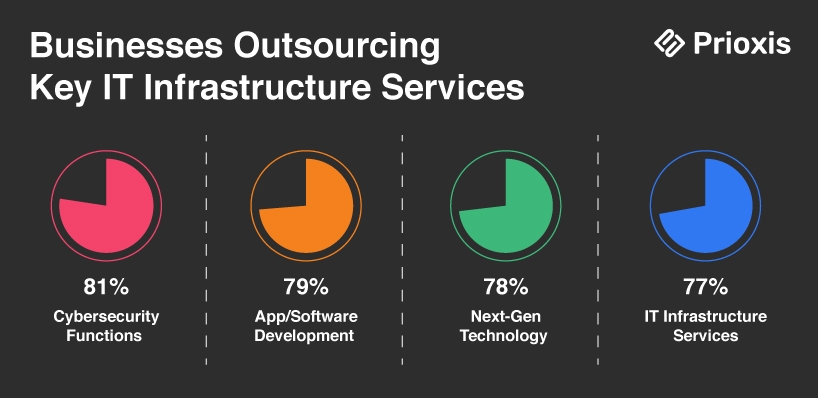
IT infrastructure outsourcing involves hiring an external company to manage your technology systems. This could include anything from maintaining your company’s servers to providing cloud optimization services or handling cybersecurity measures.
Instead of building and maintaining these services in-house, outsourcing lets you use the expertise of specialized providers focused solely on managing IT.
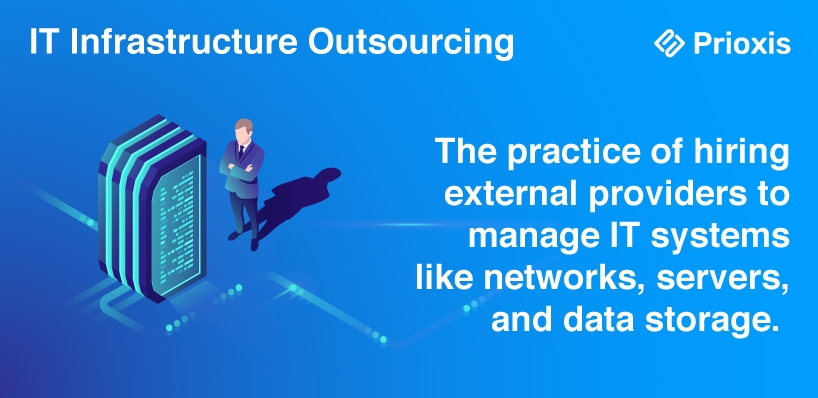
The difference between in-house IT and outsourcing lies in who manages your technology and how resources are distributed.
With an in-house team, the company hires and trains IT staff, purchases hardware, and handles everything from daily tech issues to major system overhauls. While this can give a business more control over its IT environment, it also comes with significant costs and ongoing management headaches.
Outsourcing shifts these responsibilities to an external provider. This partner brings in the necessary expertise, hardware, and software without requiring your company to invest in building and maintaining an internal IT team. You can access many resources, including the latest technology and industry experts, without large capital expenditures or constant training.
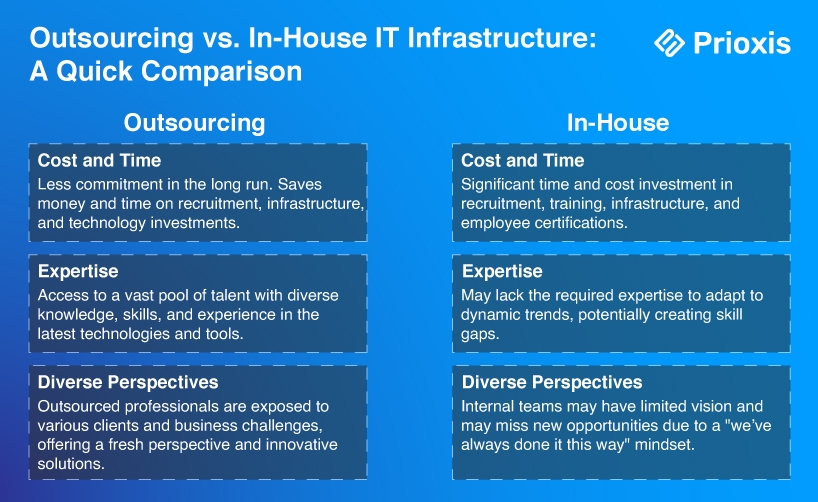
There are plenty of reasons why companies—from startups to large corporations—outsource their IT infrastructure. Whether it’s to save costs or tap into specialized skills, outsourcing offers a more innovative way to manage tech needs.
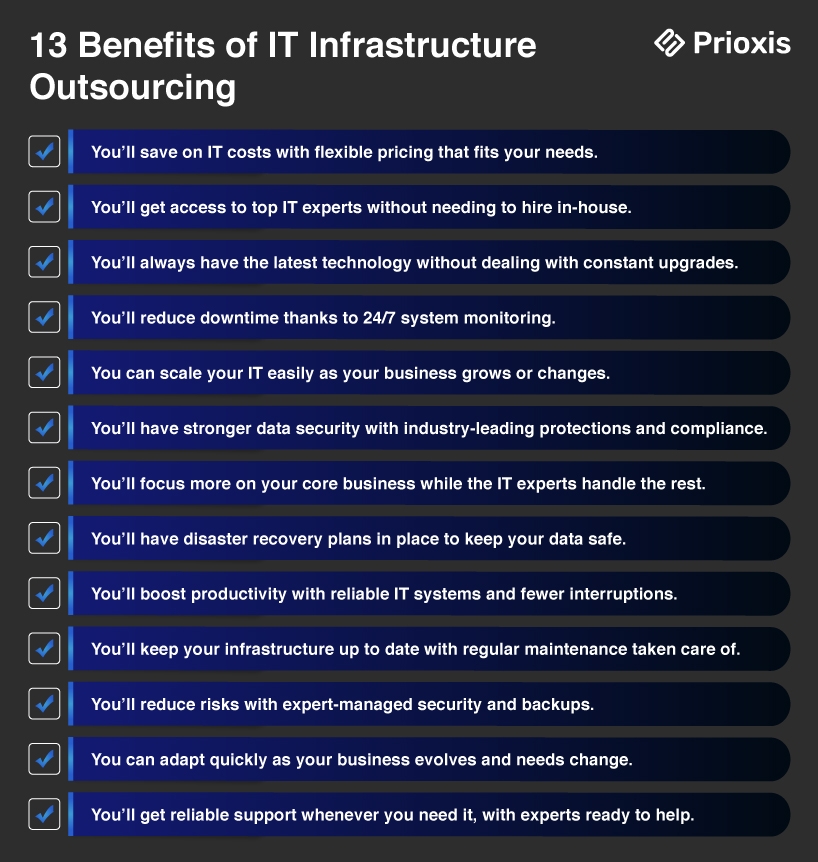
Let’s take a closer look at some of the top benefits that could make outsourcing a game-changer for your business:
When you outsource IT infrastructure, you turn fixed costs into variable costs. Instead of paying for expensive hardware, software licenses, and full-time IT staff, you only pay for what you need. Outsourcing can save companies 20% to 40% on IT expenses, which can be funneled into core business activities like product development or customer acquisition.
Imagine running a retail business that has to ramp up its IT resources during the holiday season. Rather than buying more servers or hiring temporary IT staff, you outsource. You scale up for peak times and down after, paying only for what you use.
It is evolving fast. Cybersecurity threats, cloud computing, and AI solutions constantly change the game. Keeping an in-house team trained and equipped with the latest knowledge is challenging and expensive. When you outsource, you gain immediate access to highly skilled IT professionals specializing in the newest technology trends.
In industries like finance or healthcare, where data security and compliance are non-negotiable, having access to specialized knowledge can mean the difference between staying compliant and facing hefty fines. Outsourcing ensures your company stays ahead of regulations like GDPR or HIPAA.
One of the biggest challenges with in-house IT is scalability. What happens when your company hits a growth spurt or needs to downsize? Outsourcing allows you to scale IT resources, depending on your business needs. This flexibility is beneficial for companies that experience seasonal fluctuations or rapid growth.
A tech startup experiencing rapid growth can receive help from outsourced IT that grows with them. They don't need to worry about hiring and onboarding new employees or investing in extra hardware. When the demand decreases, they can reduce their service use without penalty.
Your business isn’t IT management—so why should you spend time and resources on it? Outsourcing allows you to hand over the complexities of managing networks, data security, and cloud infrastructure to experts so your team can focus on your core business goals.
This frees up valuable resources—both time and money—that can be redirected into areas that directly affect your growth, like product innovation or customer service.
Cyberattacks and data breaches are on the rise. Companies must deal with evolving threats while also keeping up with industry compliance standards. IT outsourcing providers often offer 24/7 security monitoring and compliance with industry regulations. These providers use the latest security technologies to safeguard your data, reducing risk exposure.
Research shows that 43% of cyberattacks target small businesses. Outsourcing provides enterprise-level security without the need to build that expertise in-house. Providers offer real-time monitoring, intrusion detection, and data encryption, ensuring your business is always protected.
Nothing is worse than downtime. It disrupts business operations, frustrates customers, and can cost money. Outsourcing IT ensures your systems are monitored and managed around the clock, which minimizes system failures and downtime.
Let’s say you run an e-commerce business. Every minute of downtime means lost sales. Outsourcing your IT infrastructure guarantees consistent uptime and fast response times when issues arise, helping you avoid costly outages.
Technology moves fast. Outsourcing allows you access cutting-edge tech without the constant need to invest in new systems. Your outsourced provider ensures that your infrastructure is always up-to-date, giving you access to AI-driven solutions, cloud computing, and other advanced technologies.
Instead of worrying about upgrades or falling behind your competitors, you stay ahead with the latest innovations while focusing on what matters—growing your business.
Every business faces risks—whether it’s from data breaches, natural disasters, or system failures. Outsourced IT providers are experts at risk management and disaster recovery, meaning they’re always prepared for the unexpected. They ensure your systems are backed up and have contingency plans to cut disruptions.
Data loss or system crashes can cripple a business. A well-implemented disaster recovery plan from your IT provider will ensure your data is always backed up, and recovery happens in case of a failure, protecting your business from devastating losses.
With more reliable IT systems, your customers get a smoother experience. A strong IT infrastructure allows your team to handle customer requests faster, ensures fewer disruptions to service, and keeps your operations running seamlessly.
When your IT infrastructure runs smoothly, so does your business. Your customer service teams can focus on delivering exceptional support, knowing that the technology behind them won’t fail.
Natural disasters or system failures can bring business operations to a halt. But when you outsource IT, disaster recovery is part of the package. These providers often offer automated backups and business continuity solutions, ensuring your company can recover quickly and effectively.
Imagine a manufacturer whose systems go down due to a natural disaster. With a robust disaster recovery plan, operations could continue for days. Outsourced IT providers have the systems in place to ensure a quick recovery, reducing the impact of the disaster on business operations.
Outsourced IT providers run on a model of continuous optimization. They regularly check and update your systems to ensure efficiency and reliability, adopting the latest tech improvements. You benefit from ongoing enhancements to your IT infrastructure without needing to manage or even think about it.
As your business grows, so does the need for more efficient systems. Outsourced providers always look for ways to improve your IT performance, ensuring you get the most out of your investment.
One key benefit of outsourcing IT infrastructure is 24/7 global support. Need help at midnight? No problem. Outsourced providers have teams worldwide, ensuring that someone is always available to resolve issues, regardless of time zones.
You're covered whether you work in a single time zone or globally. This gives you peace of mind, knowing that help is always available when needed.
Outsourced IT providers often operate in the world’s biggest tech hubs, giving them access to the latest advancements and innovations. Your business gets early access to cutting-edge solutions like AI, blockchain, or cloud automation without investing in R&D.
By outsourcing, you stay at the forefront of innovation. Your business can adopt new technologies faster than competitors still relying on outdated, in-house systems.
There’s more than one way to outsource your IT. Let’s look at a few of the most popular options:
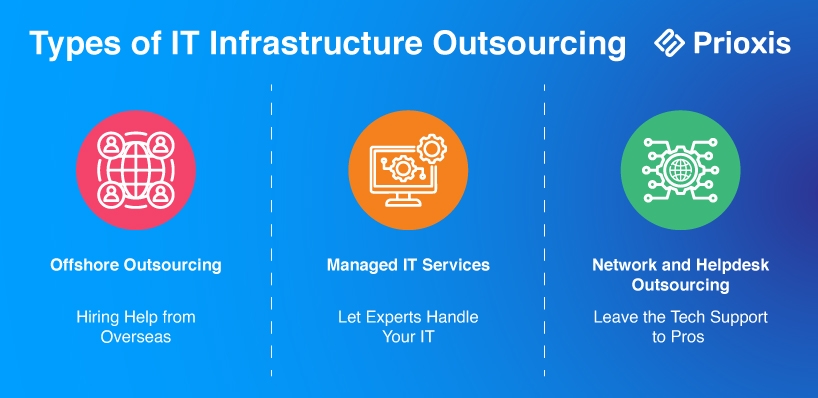
Offshore software development outsourcing is when a company gets IT services from providers in other countries. It’s a great way to save money and access talent that might not be available locally.
You hand over parts or all of your IT tasks to your managed IT service provider. This lets you focus on your business while someone else ensures your systems run smoothly. One of the core benefits of managed IT services is that they share the risk with you.
Here, you outsource network management or customer support to external providers. This keeps your network secure and your customers happy without needing an in-house team.
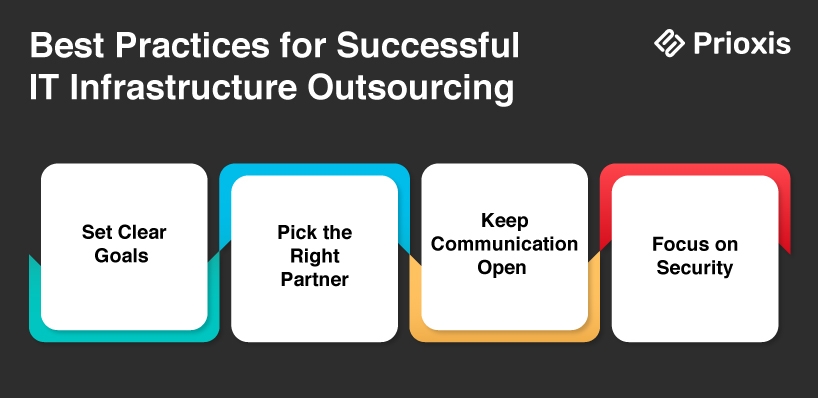
To make outsourcing work for your business, follow these essential tips:
Know exactly what you want to achieve by outsourcing. Communicate those goals clearly to your provider.
Do your homework. Find a partner with the right expertise, industry experience, and security protocols.
Regular communication ensures everyone stays aligned and helps to quickly resolve any issues.
Make sure your outsourcing provider follows strict security guidelines to protect your data and maintain compliance.
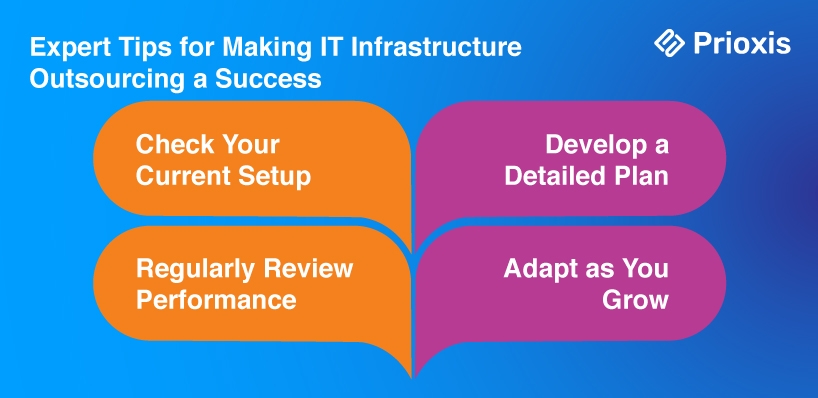
Start by assessing your current IT infrastructure to find what you should outsource and what should stay in-house.
Outline what you’re outsourcing, how success will be measured, and set clear performance indicators (KPIs).
Track the performance of your outsourcing provider to ensure you’re meeting your business goals.
Your business will change over time, and your outsourcing strategy should adapt to those changes.
Outsourcing your IT infrastructure management isn’t about saving money. But making your business more agile, secure, and scalable. Whether you need round-the-clock support, cutting-edge technology, or the peace of mind that comes with expert IT management, outsourcing can be the smartest move you make.
Want to know how outsourcing can help your business? Get a free consultation and explore how our tailored IT solutions can help you grow smarter, faster, and more securely.
Get in touch